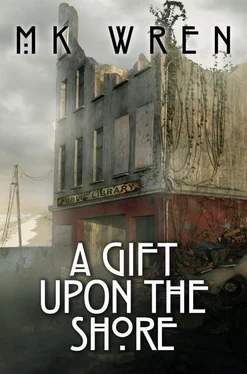He laughs uncertainly. “I don’t know.” Stephen only smiles and waits for me to go on.
“I lived in a microcosm, a lovely little island. Beyond Amarna the world was falling apart. Almost literally, when you think about the California quake. Rachel said the planet was simply adjusting its skin a bit, but what a price the insignificant creatures living on the Earth’s skin paid.”
Stephen frowns thoughtfully. “Miriam talked about that earthquake in one of her morning sermons. She said it was a prophecy of Armageddon.”
“It wasn’t a prophecy of anything,” I reply irritably. “The San Andreas fault finally gave way. The epicenter was south of San Francisco. I remember seeing skyscrapers swaying like grass in a wind, and the dust rising where buildings collapsed, and the Bay patterned with intersecting waves like a huge moiré pattern.”
Isaac’s mouth sags open. “Were you there , Mary?”
I laugh at that. “No, I wasn’t there, or I probably wouldn’t be here. I saw all that on television.” That garners only a blank look from him. I’ve explained television to the children—even shown them our old set—but they can’t really understand it. Or believe it.
I go on. “Two million people died in that quake and the tsunamis that hit the coast towns and the orgies of looting that followed. The government sent in an army of Apies and National Guard troops. Food and clothing and medicine flooded in from all over the world, and refugees flooded out. And in the midst of that appalling wreckage, Lassa fever turned epidemic.”
“What’s Lassa fever?” Isaac asks.
Stephen is quick with a reply. “I think that’s what Jeremiah called the great plague.”
No doubt that came from one of Jerry’s sermons, secondhand from sermons he heard as a child. He has no more comprehension of Lassa than Miriam does of the California earthquake. Those events are part of our mythos now.
“Yes, Lassa was a plague of sorts, Isaac. It was a contagious, viral disease. At first, people called it L-flu. But it wasn’t flu. Connie Acres showed us a bulletin from the Center for Disease Control. It wasn’t even the original Lassa fever. That was first identified years before in Africa, and it was spread by infected rats. The mutant originated in Africa, too, and by the time I read the CDC bulletin, millions of people had already died of Lassa there. In this country—we were so smug. There’d been around ten thousand deaths here from Lassa, but we thought we had the best medical system in the world. Hadn’t we finally developed a vaccine for AIDS? But this new Lassa fever wasn’t only transmitted by rats. Once it infected a human being, it could be transmitted just by personal contact, and it was almost always fatal.”
Stephen leans forward. “But Bernadette said she had the great—Lassa fever, I mean, and she lived through it.”
“Yes, some of the people who contracted it lived, if they got good care. But without hospitalization, the symptoms were lethal. Hemorrhaging, for instance. Bleeding that can’t be stopped, Isaac. Anyway, Lassa seemed to explode after the California quake. In the epidemic areas, it disrupted everything. In some of the cities, it was like a return to the dark ages. By late summer it was totally out of control. I made a note in my diary….” I pause to flip through the pages. “Here—on September first. Twenty million people had died of Lassa in the United States.” Stephen and Isaac gaze at me in awe, yet they can grasp only a minute fraction of the hopeless terror underlying that figure.
Not that I could grasp it any better at the time. I take a deep breath. “Lassa wasn’t the only apocalyptic plague humankind was suffering. There were the constant small wars, of course, but the other plague—and it was more deadly than Lassa, really—was starvation. I remember seeing a television news feature that showed a food drop at a camp near Mexico City. Big helicopters with bales of food spilling out into a whirlwind of dust. And the people—they looked like dry sticks hung with rags, and it seemed impossible that they could even walk. Yet they all got up and began running toward the whirlwind, toward the food. There were so many of them, they were like a dark tide. I remember Rachel said, ‘ There is the future.’ And she was crying.” I clear my throat of the huskiness in my voice. “We stopped watching the television for a while after that. We closed our window to the world. But eventually we opened it again. In June the president was killed. Someone bombed the White House.”
“What white house?” Isaac asks.
“That was what they called the big house where the president of the United States lived. There’s a picture of it in the encyclopedia. Anyway, they never found out who did it, but the Bill of Rights was suspended, and the Apies rounded up tens of thousands of ‘suspected terrorists’—most of them guilty of nothing more than having no home or job—and threw them in detention camps, which were perfect breeding grounds for Lassa. The rampant stupidity! That was the real epidemic. Pandemic. What was happening in this country was happening all over the world.” I close my eyes, wondering how the frustration can still sting me like a thicket of thorns even after all these years. I call up a smile for Isaac and Stephen, to whom so much of this is meaningless. Yet they must understand what they can. At least, Stephen must.
I go on, “But here at Amarna the weather was ideal, the garden flourished, and I’d become very fond of goat’s milk and learned to look a rabbit in the eye and slit its throat— and gut, skin, and dismember it. Isaac, don’t laugh. That was a real accomplishment for a city girl.”
Of course, he does laugh, then he asks, “Who was a city girl? What does that mean?”
“ I was a city girl. I came from a city, and I was—loosely speaking—a girl.” His smile is edged with uncertainty at that. No doubt he can’t imagine me as a girl. “Yes, I was young then, but the world was still falling apart. We could close our window to it, but one day it came crashing through our front door. Not literally, Isaac. That’s just a way of saying something… terrible happened.”
Stephen’s breath catches, and Isaac looks up at him, blue eyes wide. Stephen asks, “Was it Armageddon?”
He persists in calling it that because he hears the adults use that term. Yet our Elder, the arbiter of all things religious and moral here, declares that the true Armageddon, the one prophesied in such lurid detail by Saint John, is yet to come. Jerry denies the End as Armageddon because his father denied it. Finally.
“No, Stephen, not Armageddon. Rovers.”
“What’s a Rover?” Isaac asks.
“They were road gangs, Isaac. Groups of people—most of them young and into heavy drugs—who lived along the highways and attacked cars, trucks, or buses. They usually killed the people in them.”
Isaac stares at me, aghast. “Why did they do that?”
“I don’t know. Maybe because they were insane. Insanity is one of the symptoms of too many. Anyway, the gang that attacked my bus stayed in the area all spring. The Apies sent reinforcements, and that kept them under control, but by late June the extra Apies were needed elsewhere, and the Rovers came out of hiding.” I look down at the diary, turn the pages back to June, but I’m not really seeing the writing that on these pages has become so cramped, nearly illegible.
“It was the day before the summer solstice. A grocery day. Food deliveries had been erratic for months, but usually a Safeway convoy came in Thursday night, and everyone in Shiloh did their shopping on Friday. Rachel and I always drove down to the mall with Connie and Jim, but that Friday morning Jim phoned and said there’d be no grocery run. The night before, the Rovers hit the supermarket just as the convoy arrived. There was a small, bloody battle—Jim rather bitterly called it the battle of the mall—and a lot of people were killed or hurt, including four of Captain Berden’s officers. The Rovers blew up all three trucks. That was typical of them with cars or trucks. They just kept shooting until the gas tanks exploded. We didn’t see Jim and Connie that day. They were both busy at the clinic with the casualties. Rachel and I worked in the garden and walked on the beach, just like any other day. That night Jim called and said everything was under control in Shiloh, and another Safeway convoy would arrive Monday. So we went to bed.”
Читать дальше












